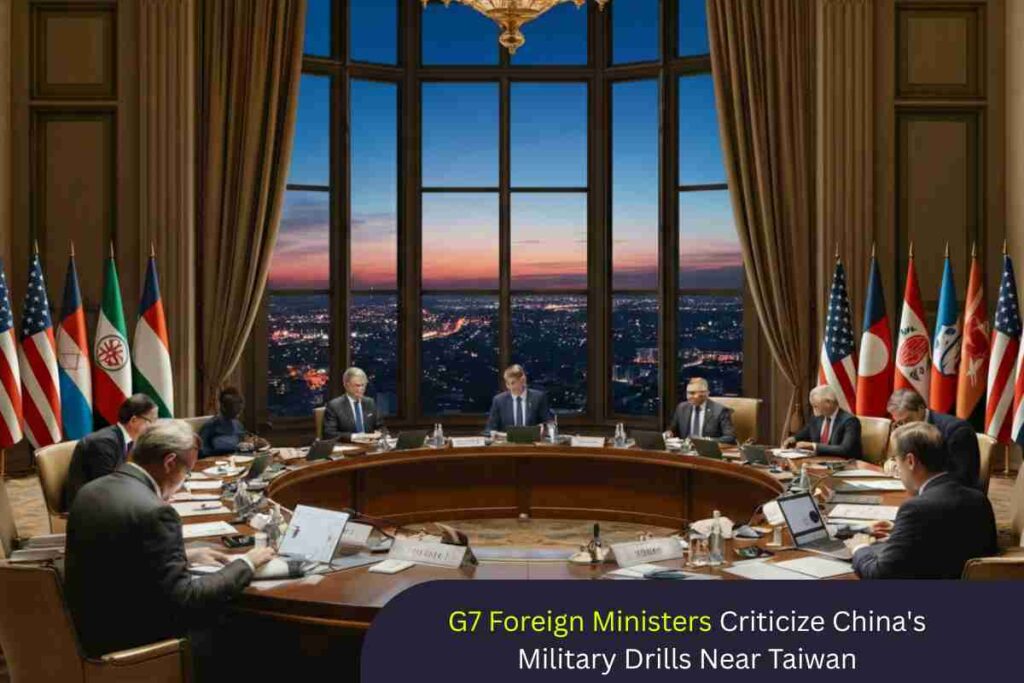G7 Foreign Ministers Criticize China’s Military Drills Near Taiwan
China’s recent large-scale military drills around Taiwan have sparked significant international concern, especially from the G7 Foreign Ministers and the European Union’s High Representative. The drills, described as provocative and destabilizing, have raised tensions in the Taiwan Strait, a region critical to global security. This blog breaks down the G7’s statement, China’s response, and why this discussion is shaping the international political landscape.
Political analysts, this is your inside guide to understanding what these developments mean for regional stability, diplomatic relations, and global geopolitics.
What Did the G7 Statement Say?
On April 6, 2025, the G7 Foreign Ministers of Canada, France, Germany, Italy, Japan, the United Kingdom, and the United States, along with the EU’s High Representative, released a joint statement expressing “deep concern” over China’s military activities around Taiwan. Their statement highlighted several key points:
- The military drills were described as “provocative actions” that escalate cross-Strait tensions.
- The G7 emphasized the importance of peace and stability in the Taiwan Strait and opposed any unilateral actions that threaten this balance, including the use of force or coercion.
- A call for constructive dialogue was made, urging the peaceful resolution of issues between China and Taiwan in alignment with international commitments.
By framing these drills as a threat to “global security and prosperity,” the G7 aimed to underscore the geopolitical implications beyond this region, framing it as an issue of international rather than purely regional significance.
What Prompted China’s Military Drills?
China’s People’s Liberation Army (PLA) initiated the joint military drills between April 1-2, 2025, around Taiwan, an act Beijing has referred to as a “stern warning” to separatist forces advocating for Taiwan’s independence.
China views Taiwan as an inalienable part of its territory and condemns any external forces supporting Taiwan’s independence. Chinese officials justified the drills as a response to what they see as aggressive provocations by Taiwan’s leadership and their collaboration with Western powers, particularly the United States.
Key statements from Chinese officials emphasized that:
- Taiwan’s independence activities “threaten peace across the Strait.”
- The drills are framed as necessary for defending national sovereignty and territorial integrity.
The PLA Eastern Theater Command reiterated their commitment to “resolutely thwarting any separatist activities,” sending a clear signal to both Taiwan and the broader international community.
Taiwan Strait Tensions and Regional Implications
The Taiwan Strait sees approximately $3.4 trillion in global trade pass annually, making it one of the most geopolitically sensitive regions in the world. Escalating military activity in this area has implications beyond the two principal actors involved.
1. Regional Stability Risk
China’s military drills have exacerbated fears of a miscalculation that could potentially ignite a broader conflict in East Asia. Neighboring nations like Japan and South Korea are closely monitoring the situation, aware of the possible overflow of tensions into their own strategic environments.
2. US-China Rivalry
Tensions in the Taiwan Strait are increasingly viewed as a flashpoint in the growing rivalry between the United States and China. The US has historically maintained a policy of strategic ambiguity regarding Taiwan but continues to bolster Taiwan militarily, further fueling Chinese perceptions of Western interference.
3. Global Economic Impact
Any potential conflict in this region could severely disrupt global supply chains, particularly given Taiwan’s critical role in semiconductor manufacturing.
The G7 and China’s Dueling Narratives
This situation underscores diverging international narratives.
G7’s Position on Taiwan
- The G7 has made clear its support for maintaining the current status quo, emphasizing the importance of peaceful dialogue.
- By framing China’s actions as “provocative,” the G7 seeks to pressure Beijing while reassuring allies in the Indo-Pacific region of Western support.
China’s Counter-Narrative
- China insists that discussions regarding Taiwan fall exclusively within its domestic jurisdiction and characterizes foreign involvement as interference.
- Chinese state media have accused the G7 and Western nations of exploiting the “Taiwan card” to encircle China strategically, heightening tensions in the Indo-Pacific.
Why This Matters to Global Politics
Taiwan as a Flashpoint for Policy
What happens in the Taiwan Strait affects not just East Asia, but security frameworks globally. The G7’s statement also subtly rallies the larger international community to address what is increasingly seen as a critical intersection of military strategy and economic interests.
The Clash of Governance Models
At its core, this conflict reflects a larger ideological competition between authoritarian governance (as championed by China) and liberal democracies backed by the G7.
Implications for Multilateral Structures
The Taiwan issue is a litmus test for the efficacy and cohesion of multilateral organizations like the G7 and ASEAN in responding to security challenges.
Where Do We Go from Here?
The likelihood of cross-Strait military or political resolution remains uncertain. However, the growing frequency of these tense interactions demands sustained dialogue and diplomatic engagement. The G7 Ministerial statement, while significant, underlines the need for broader collective action to prevent escalation.
Actionable Next Steps for Stakeholders:
- For Political Analysts: Keep monitoring regional developments. Analyze how China’s actions align with or deviate from their stated policy positions over time.
- For Governments: Strengthen diplomatic channels with both China and Taiwan to mediate tensions. Ensure regional stability policies include economic and security contingencies.
- For International Institutions: Foster dialogue between nations to avoid military miscalculations and address economic vulnerabilities tied to the Taiwan Strait.
